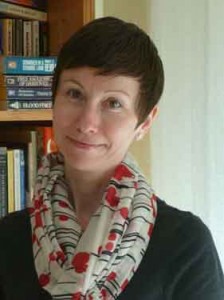Jenée Wilde, a PhD candidate in English and Folklore, has received the 2014-15 Jane Grant Dissertation Fellowship for her interdisciplinary research project on bisexual representation, science fiction, and the overlaps among bisexual and fan communities.
Awarded by the Center for the Study of Women in Society, the Jane Grant Fellowship includes a $12,000 stipend, tuition remission and insurance for the 2014-15 academic year.
In addition, Wilde received a Sherwood Research/Travel Award from the Department of English to attend the 2014 Project Narrative Summer Institute at the Ohio State University, where she plans to workshop part of her dissertation. Wilde also was offered a 2014-15 Oregon Humanities Dissertation Fellowship but declined the honor in order to accept the Jane Grant Fellowship.
Wilde says her research approach is unusual for an English dissertation.
“Unlike traditional humanities research, half of my project is based on ethnographic fieldwork I conducted in Philadelphia and Minneapolis in communities where bisexual and fan identities overlap,” Wilde said. “My goal is to challenge the dearth of research on bisexuality in humanities and some social sciences and to demonstrate the untapped potential of bisexuality studies across academic fields.”
Wilde’s dissertation project, “Speculative Fictions, Bisexual Lives: Changing Frameworks of Sexual Desire,” combines methodologies from literary studies, queer cultural studies, and folklore to study bisexual representation in non-realistic or “speculative” literature and television, and to study the overlaps among some bisexual and fan communities.
“Imagining alternatives to ‘normal’ human life is what speculative fiction does best,” Wilde said. “That makes it an ideal site for exploring marginalized sexual representation and identity.”
The project includes critical analysis of dissident sexuality in 1960s-1970s speculative literature, archival research of a 1980s bisexual fanzine, cultural analysis of contemporary genre television shows, and ethnographic research with bisexually identified speculative fiction fans.
Wilde’s research suggests that the “both-and” logic upon which bisexuality is structured may provide a key to reframing categories of sexual knowledge that depend on “either-or” to understand the sexuality and gender of another. As part of her project, Wilde theorizes “dimensional sexuality” as a hermeneutic method and social science research model that may contribute broadly to humanistic inquiry across the academy.
“I’m trying to intervene in interpretive practices and theoretical assumptions that may contribute to binary gender and sexual norms,” Wilde said. “In short, I want to fundamentally change the logic we use to organize dominant categories of sexual knowledge.”
An article describing Wilde’s theory, “Dimensional sexuality: Exploring new frameworks for bisexual desires,” has recently been accepted for publication by the British journal Sexual and Relationship Therapy. A peer reviewer for the journal called the article “very absorbing and a significant contribution to theorising bisexualities.”
Among other honors, Wilde received the 2013 John R. Moore Scholarship, presented to a student who excels in contributions to the lesbian, gay, bisexual, transgender, and queer community at the University of Oregon, and the 2013 Miller Family Scholarship, presented to an outstanding student in Women’s and Gender Studies. She also was awarded the 2012 Norman Brown Graduate Fellowship, presented by the College of Arts and Sciences for academic merit and potential for academic contributions.


